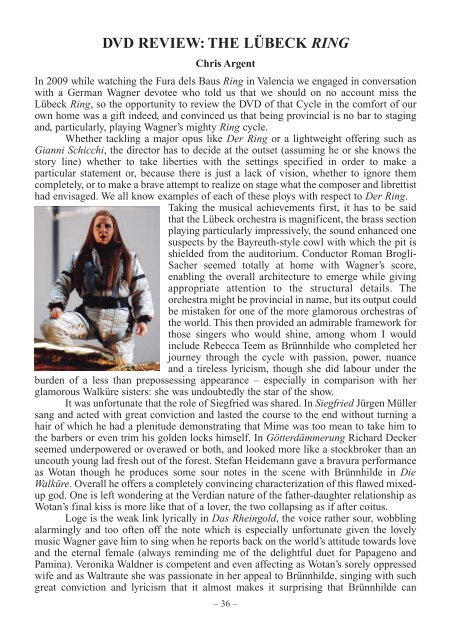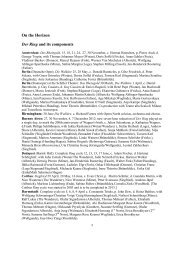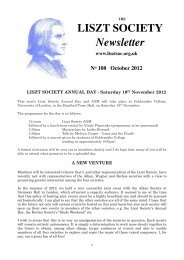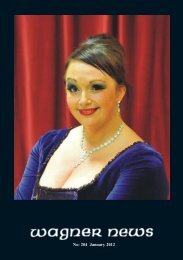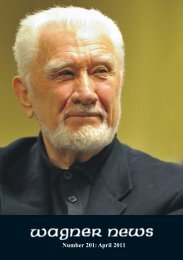13895 Wagner News 174 - Wagner Society of England
13895 Wagner News 174 - Wagner Society of England
13895 Wagner News 174 - Wagner Society of England
Create successful ePaper yourself
Turn your PDF publications into a flip-book with our unique Google optimized e-Paper software.
DVD REVIEW: THE LÜBECK RING<br />
Chris Argent<br />
In 2009 while watching the Fura dels Baus Ring in Valencia we engaged in conversation<br />
with a German <strong>Wagner</strong> devotee who told us that we should on no account miss the<br />
Lübeck Ring, so the opportunity to review the DVD <strong>of</strong> that Cycle in the comfort <strong>of</strong> our<br />
own home was a gift indeed, and convinced us that being provincial is no bar to staging<br />
and, particularly, playing <strong>Wagner</strong>’s mighty Ring cycle.<br />
Whether tackling a major opus like Der Ring or a lightweight <strong>of</strong>fering such as<br />
Gianni Schicchi, the director has to decide at the outset (assuming he or she knows the<br />
story line) whether to take liberties with the settings specified in order to make a<br />
particular statement or, because there is just a lack <strong>of</strong> vision, whether to ignore them<br />
completely, or to make a brave attempt to realize on stage what the composer and librettist<br />
had envisaged. We all know examples <strong>of</strong> each <strong>of</strong> these ploys with respect to Der Ring.<br />
Taking the musical achievements first, it has to be said<br />
that the Lübeck orchestra is magnificent, the brass section<br />
playing particularly impressively, the sound enhanced one<br />
suspects by the Bayreuth-style cowl with which the pit is<br />
shielded from the auditorium. Conductor Roman Brogli-<br />
Sacher seemed totally at home with <strong>Wagner</strong>’s score,<br />
enabling the overall architecture to emerge while giving<br />
appropriate attention to the structural details. The<br />
orchestra might be provincial in name, but its output could<br />
be mistaken for one <strong>of</strong> the more glamorous orchestras <strong>of</strong><br />
the world. This then provided an admirable framework for<br />
those singers who would shine, among whom I would<br />
include Rebecca Teem as Brünnhilde who completed her<br />
journey through the cycle with passion, power, nuance<br />
and a tireless lyricism, though she did labour under the<br />
burden <strong>of</strong> a less than prepossessing appearance – especially in comparison with her<br />
glamorous Walküre sisters: she was undoubtedly the star <strong>of</strong> the show.<br />
It was unfortunate that the role <strong>of</strong> Siegfried was shared. In Siegfried Jürgen Müller<br />
sang and acted with great conviction and lasted the course to the end without turning a<br />
hair <strong>of</strong> which he had a plenitude demonstrating that Mime was too mean to take him to<br />
the barbers or even trim his golden locks himself. In Götterdämmerung Richard Decker<br />
seemed underpowered or overawed or both, and looked more like a stockbroker than an<br />
uncouth young lad fresh out <strong>of</strong> the forest. Stefan Heidemann gave a bravura performance<br />
as Wotan though he produces some sour notes in the scene with Brünnhilde in Die<br />
Walküre. Overall he <strong>of</strong>fers a completely convincing characterization <strong>of</strong> this flawed mixedup<br />
god. One is left wondering at the Verdian nature <strong>of</strong> the father-daughter relationship as<br />
Wotan’s final kiss is more like that <strong>of</strong> a lover, the two collapsing as if after coitus.<br />
Loge is the weak link lyrically in Das Rheingold, the voice rather sour, wobbling<br />
alarmingly and too <strong>of</strong>ten <strong>of</strong>f the note which is especially unfortunate given the lovely<br />
music <strong>Wagner</strong> gave him to sing when he reports back on the world’s attitude towards love<br />
and the eternal female (always reminding me <strong>of</strong> the delightful duet for Papageno and<br />
Pamina). Veronika Waldner is competent and even affecting as Wotan’s sorely oppressed<br />
wife and as Waltraute she was passionate in her appeal to Brünnhilde, singing with such<br />
great conviction and lyricism that it almost makes it surprising that Brünnhilde can<br />
– 36 –


